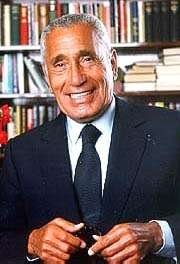01 October 2006
wtf would he know - heikal
.
Mohamed Heikal
The Guardian
October 10, 2001

Mohamed Heikal, an effortlessly urbane 78-year-old, has been a journalist for almost 60 years, as editor and chairman of the influential Egyptian daily Al-Ahram for almost 20, and has written a dozen highly regarded books on Egypt and Iran. From the first days of the revolution, he was close to President Nasser, and was briefly - and reluctantly - his minister of information and foreign affairs in 1970. He enjoyed an equally close but rather more volatile relationship with President Sadat, who imprisoned him in 1981 for opposing the Camp David negotiations.
Heikal questions whether Osama bin Laden and his al-Qaida network were solely responsible for the September 11 attacks, arguing that the limited evidence so far presented is far from convincing.
"Bin Laden does not have the capabilities for an operation of this magnitude. When I hear Bush talking about al-Qaida as if it was Nazi Germany or the communist party of the Soviet Union, I laugh because I know what is there.
Bin Laden has been under surveillance for years: every telephone call was monitored and al-Qaida has been penetrated by American intelligence, Pakistani intelligence, Saudi intelligence, Egyptian intelligence. They could not have kept secret an operation that required such a degree of organisation and sophistication."
Heikal gives little credence to suggestions that a more central planning role may have been played by Bin Laden's nominal deputy, Ayman al-Zawahiri, the leader of Egyptian Islamic Jihad.
"He is dangerous and was involved in the assassination of Sadat, but he is not a great thinker or a great planner. He played a peripheral role in the assassination, which itself was marked by superficial planning and only succeeded because of luck. As their interviews with al-Jazeera showed, Bin Laden and al-Zawahiri rely on nothing but their instincts. This is not Hamas or the Muslim Brotherhood, this is an isolated minority who reflect neither Islam nor our times. They are the historic residue of oppression; they don't represent the future."
There may, Heikal believes, be some as yet undiscovered element in the atrocity of September 11. Whatever the truth, he says that the explanations so far have been hasty, inconclusive and remarkably convenient.
"I understand that the American administration wanted an enemy right away to hit, to absorb the anger of the American people," he says, "but I wish they had produced some real evidence."
"I read what Mr Blair said in the House of Commons carefully: they had prepared the atmosphere for that statement by saying he is going to reveal some of the proof, but there is no proof, nothing; it is all deductions. "
"Colin Powell was more honest than anybody: he said if not this, it doesn't matter, he has committed so many other crimes that necessitate taking action against him."
Mohamed Heikal
The Guardian
October 10, 2001

Mohamed Heikal, an effortlessly urbane 78-year-old, has been a journalist for almost 60 years, as editor and chairman of the influential Egyptian daily Al-Ahram for almost 20, and has written a dozen highly regarded books on Egypt and Iran. From the first days of the revolution, he was close to President Nasser, and was briefly - and reluctantly - his minister of information and foreign affairs in 1970. He enjoyed an equally close but rather more volatile relationship with President Sadat, who imprisoned him in 1981 for opposing the Camp David negotiations.
Heikal questions whether Osama bin Laden and his al-Qaida network were solely responsible for the September 11 attacks, arguing that the limited evidence so far presented is far from convincing.
"Bin Laden does not have the capabilities for an operation of this magnitude. When I hear Bush talking about al-Qaida as if it was Nazi Germany or the communist party of the Soviet Union, I laugh because I know what is there.
Bin Laden has been under surveillance for years: every telephone call was monitored and al-Qaida has been penetrated by American intelligence, Pakistani intelligence, Saudi intelligence, Egyptian intelligence. They could not have kept secret an operation that required such a degree of organisation and sophistication."
Heikal gives little credence to suggestions that a more central planning role may have been played by Bin Laden's nominal deputy, Ayman al-Zawahiri, the leader of Egyptian Islamic Jihad.
"He is dangerous and was involved in the assassination of Sadat, but he is not a great thinker or a great planner. He played a peripheral role in the assassination, which itself was marked by superficial planning and only succeeded because of luck. As their interviews with al-Jazeera showed, Bin Laden and al-Zawahiri rely on nothing but their instincts. This is not Hamas or the Muslim Brotherhood, this is an isolated minority who reflect neither Islam nor our times. They are the historic residue of oppression; they don't represent the future."
There may, Heikal believes, be some as yet undiscovered element in the atrocity of September 11. Whatever the truth, he says that the explanations so far have been hasty, inconclusive and remarkably convenient.
"I understand that the American administration wanted an enemy right away to hit, to absorb the anger of the American people," he says, "but I wish they had produced some real evidence."
"I read what Mr Blair said in the House of Commons carefully: they had prepared the atmosphere for that statement by saying he is going to reveal some of the proof, but there is no proof, nothing; it is all deductions. "
"Colin Powell was more honest than anybody: he said if not this, it doesn't matter, he has committed so many other crimes that necessitate taking action against him."